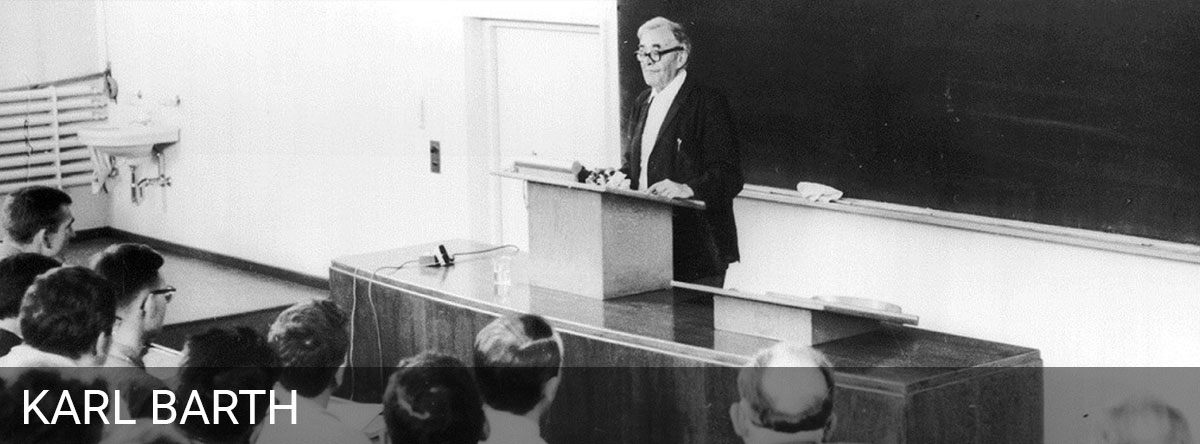Karl Barth was not only an important theologian, but also a gifted wordsmith. The following quotes are extracts from Insights, (original: Augenblicke) a collection of 94 short texts from Karl Barth, selected by Eberhard Busch, Karl Barth’s longtime assistant.
Insights provides a great introduction into Karl Barth’s work and his faith. Each of its texts is related to a verse of Scripture and shows Barth’s sense of wonder and amazement.
On Amazement
At the beginning of all theological perception, research, and thought – and also of every theological statement – stands a quite specific amazement. Its lack in even the best theologian will threaten the heart of the entire enterprise, while even bad theologians are not a lost cause in their service and their duty, as long as they are still capable of amazement.
On Humor
Having a sense of humor means not being stiff but flexible. Humor arises when we have insight into the contradiction between our existence as children of God and as children of this age, and we become conscious of our actions in a lively way. Humor means a great bucketing of the serious side of the present.
On Fearless
What should we do, then so that the nations will really want peace? First of all, we should not have so much fear – namely about the evil intentions of others.
Joy in God
Joy is the rarest and most infrequent thing in the world. We already have enough fanatical seriousness, enthusiasm, and humorless zeal in the world. But joy? This shows us that the perception of the living God is rare. When we have found God our Saviour – or when he has found us – we will rejoice in him.
Freedom
It is true that free people will also strive for independence, as far as that makes sense. But free people are not compelled to want independence by every external compulsion. They can also find all kinds of undesired discipline to be acceptable and pleasing.
On Against the Stream
Nothing has happened to change the fact that Christians – even in the middle of their supposedly and perhaps even very consciously Christian environment – will always be strange and threatened creatures. In any case, they will not be going with the flow. For them the great truths of conventional wisdom will never have absolute validity. Nor, certainly, will their absolute negation, and thus they will also hardly be able to count on the applause of current revolutionaries. And they will cultivate their freedom not only in free thoughts in private, but also in free and open deeds and modes of behaviour that will never find public approval.
On Easter
What happened on that day (of Easter) became, was and remained the centre around which everything else moves. For everything lasts its time, but the love of God – which was at work and was expressed in the resurrection of Jesus Christ from the dead – lasts forever. Because this event took place, there is no reason to despair, and even when we read the newspaper with all its confusing and frightening news, there is every reason to hope.
—
On Being a Pastor Today:
In 1962, Karl Barth visited Princeton Theological Seminary. During a Q&A session following one of his Warfield Lectures, a student asked him the following question:
Student: “What one thing, sir, would you tell a young pastor today, if you were asked, is necessary in this day and age to pastor a Church?”
Barth: “Ah, so big a question! That is the whole question of theology, you see! I should say, I hope that during your studies you have visited yourself earnestly with the message of the Old Testament and of the New Testament. And not only of this message but also of the Object and the Subject of this message. And I would ask you, are you trained to visit not only yourself now, but a congregation with what you have learned out of the Bible and of church history and dogmatics and so on? Having to say something, having to say that thing. And then the other question: are you willing now to deal with humanity as it is? Humanity in this twentieth century with all its passions, sufferings, errors, and so on? Do you like them, these people? Not only the good Christians, but do you like people as they are? People in their weaknesses? Do you like them, do you love them? And are you willing to tell them the message that God is not against them, but for them? That’s the one real thing in pastoral service and that is the question for you. If you go into ministry to do that work, pray earnestly. You’ll do difficult work but beautiful work.
But if I had to begin again anew for myself as a young pastor, I would tell myself every morning, well, here I am: a very poor creature, but by God’s grace I have heard something. I will need forgiveness of my sins everyday. And I will pray, God, that you will give me the light, this light shining in the Bible and this light shining into the world in which humanity is living today. And then do my duty.”


